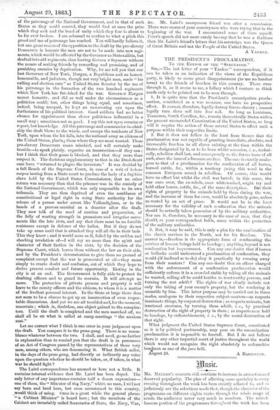TII E PRESIDENT'S PROCLAMATION.
To TIIE EDITOR OF THE "SPECTATOR."
SIR,—The last letter of your " Yankee " correspondent, if it can be taken as an indication of the views of the Republican party, is likely to cause great disappointment (to use no harsher term) to the friends of freedom in this country. There runs through it, as it seems to me, a fallacy which I venture to think needs only to be pointed out to be seen through.
1. It is quite true that the President's emancipation procla- mation, considered as a war measure, can have no prospective effect. It cannot, therefore, legally destroy future slavery ; cannot legally turn slave soil into free soil. So long as Louisiana, Tennessee, South Carolina, &c., remain theoretically States within the present unamended Constitution of the United States, so long will it require the action of those several States to effect such a purpose within their respective limits.
2. But it does not follow in the least from thence that the proclamation was not capable of granting immediate, absolute, and irrevocable freedom to all slaves existing at the time within the States designated by it, or to be born whilst secession, i. e., techni- cally, rebellion shall last, and consequently to the future issue of all such, since the issue of a freeman are free. The case is exactly analo- gous to that of a proclamation for the confiscation of all horses, horned cattle, &c., within a territory (using this word in the common European sense) in rebellion. Of course, this would have no effect but whilst the civil war lasted; in this sense, the war once over, the ex-rebels, once whitewashed, might try and hold other horses, cattle, &c., of the same description. Bat their rights of property in the animals held by them during the war, and the increase of them for ever, would be absolutely gone, unless re-vested by an act of grace. It would not be in the least necessary for the validity of such confiscation that the animals should be actually taken possession of by the military authorities. Nor can it, therefore, be necessary in the case of men, that they should, as your correspondent holds, come within the protection of the military authorities.
3. But, it may be said, this is only a plea for the confiscation of the slave's services to the North, not for his freedom. The answer is,—freedom is the appropriate form of confiscating the services of human beings held to bondage ; anything beyond is not confiscation but impressment. Can any one doubt that if horses or bullocks could understand a proclamation of confiscation, they would (if inclined so to do) obey it practically by running away from their masters ? Can any one doubt that an officer charged with the enforcement of a confiscation proclamation would sufficiently enforce it in a crowded stable by taking all the animals he wanted, selling all he could besides to trustworthy persons, and turning the rest adrift? The rights of war clearly include not only the taking of your enemy's property, but the rendering it unusable by him. This latter purpose may be carried out in three modes, analogous to their respective subject-matters--as respects inanimate things, by corporeal destruction ; as respects animate, but irrational creatures, by turning them adrift, i. e., by practical destruction of the right of property in them ; as respects men held to bondage, by enfranchisement, i. e., by the moral destruction of
• that right.
What judgment the United States Supreme Court, constituted as it is by political partizanship, may pass on the emancipation proclamation it is impossible to foretell. But I do not believe there is any other impartial court of justice throughout the world which would not recognize the right absolutely to enfranchise bondmen as one of the jura belli.






























 Previous page
Previous page